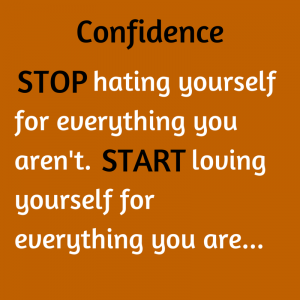Confidence is made up from two things that we have control over, each of us individually. The first thing we have control over is our character. It is our choice who we are, what the highest self is, how we act and what we choose to believe about ourselves and others. The stronger our character, the better we are as humans, the better we feel about ourselves as people who have something to contribute to the world.
The second thing that builds confidence is attaining skills, being able to do things with some proficiency. Those skills that we gain will be different for every person, depending on what natural abilities that they were born with, their environment and what they are exposed to as they grow as individuals and what their interests are. That makes each of us unique.
At the same time, all of us can learn new things, and that learning process and gaining proficiency in different area builds confidence. We may not be as good as others in what we can do, but as new skills are learned, it helps us to appreciate that with some effort and practice we can grow in other talents that may not have come to us naturally.
In this quest for new skills though, we can suffer setbacks and have failures, and for some, this is a real hit on their confidence. We must remember that our confidence is strengthened when we overcome those failures. Those are our learning moments.
If we never try something new and give ourselves the opportunity to learn, be willing to have failures and try again it is not possible to strengthen the virtue of confidence. Confidence comes from perseverance under difficult circumstances and having the reward of overcoming those difficulties.
I once had a student who was learning to jump rope and tried for several months to reach the stated goal of 45 seconds of continuous rope jumping. Despite practice and trying over and over he would get to 42 or 43 seconds and then miss. One day in one of his attempts he reached his goal of 45 seconds, and we were all so impressed with his determination. If that were where the story ended, it would have been a victory.
However, in just a couple of weeks he came in and asked me to time his jumping rope, and I did so. Unbelievably on that day, he jumped seven minutes and 26 seconds. He had confidence in his ability to persevere and overcome. His confidence still shows today as he learns new things in class if they do not come easy for him, he has the confidence that they will come with determination and he has just not gotten it yet.
Parents, as you watch your children learn new things there, will be times of failure. This is not the time to step in and do it for them or to save them from the consequences of mistakes. Failures and Consequences are how all of us learn and how we build confidence in our ability to overcome no matter what our age might be.

